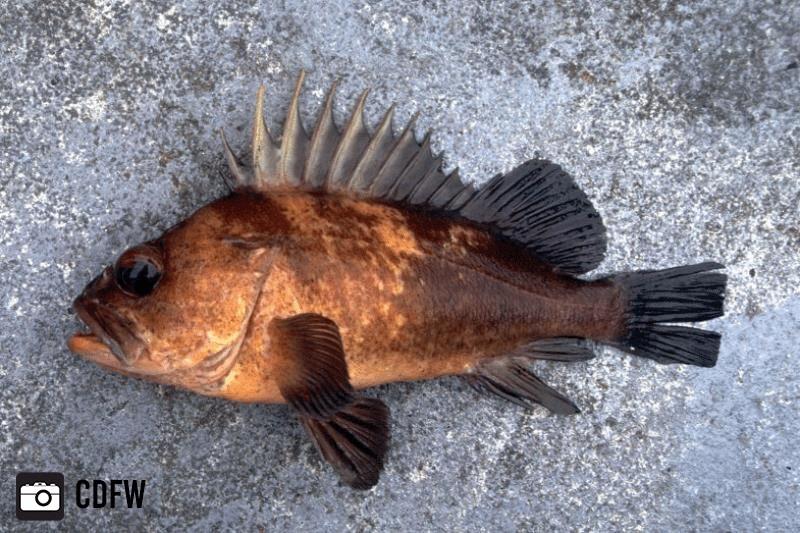
ASA advocates for a full stock assessment of California Quillback Rockfish in 2025
by Larry Phillips 19 Mar 21:11 UTC

Quillback Rockfish © CDFW
California quillback rockfish took center stage during the Pacific Fisheries Management Council (PFMC) meeting in Fresno, California. American Sportfishing Association's (ASA) Pacific Fisheries Policy Director, Larry Phillips, joined other members of the recreational fishing industry and the Council to discuss the future management of this important sport fish species.
Historically quillback rockfish were managed by the PFMC as one stock (from California to Washington) and as part of a complex that included other rockfish species that occupy shallow near-shore habitat. Unfortunately, a recent management decision to remove quillback rockfish from the complex and to conduct an assessment using limited data (data moderate), resulted in emergency fishing closures in 2023 and future opportunities that are uncertain.
The stock status of nearshore rockfish is less understood than other rockfish species because they are not readily collected using traditional trawl sampling techniques and are infrequently encountered using standard survey methods. These assessments are often referred to as "data moderate" because there is no index of abundance and stock assessment biologists sometimes rely on pre-specified parameters of the population dynamics model (growth and mortality).
Quillback rockfish have also historically represented a relatively small portion of the total nearshore rockfish harvested but are typically caught while targeting more abundant species such as black, vermilion, and copper rockfish.
In 2021, in response to concerns about potential declining biomass, a quillback rockfish stock assessment was completed to separate quillback rockfish into distinct groups based on state boundary lines. The initial stock assessment concluded that California quillback rockfish biomass had been depleted by 86%, requiring the PMFC to initiate the rebuilding process.
Shortly after fisheries managers shared the results of the 2021 assessment, recreational fishing representatives and fisheries experts began to question the accuracy. Questions around how biological information (age and growth) was collected, how the assessment accounted for areas closed to fishing, such as marine protected areas, and how quillback rockfish were being disproportionately harvested started to arise.
During the November meeting, the PMFC heard public comments, including testimony (and written comments) from Dr. Ray Hilborn and Dr. Mark Maunder, and from Council members (CA and WA) regarding concerns about the 2021 quillback rockfish stock assessment. Based on these concerns, the Council postponed the adoption of the rebuilding analysis and directed the Science and Statistical Committee (SSC) to hold an unprecedented "special meeting" with Dr. Maunder and Dr. Hilborn to review their comments.
Before this special meeting could take place, NOAA's National Marine Fisheries Service (NMFS) sent a letter to the Pacific Fisheries Management Council (PFMC) regarding their determination that quillback rockfish off the California Coast was overfished according to the Pacific Coast Groundfish Fishery Management Plan (FMP). Under the details of the plan, quillback rockfish are expected to be rebuilt as soon as 2045 (under complete closures) or as late as 2071 (some fishing mortalities).
The special meeting of the SSC (Groundfish Subcommittee) was ultimately held in Seattle in January 2024. Both Dr. Hilborn and Dr. Maunder as well as members of the public (including myself) testified. The SSC concluded in a written report to the council that:
The assessment of quillback rockfish off California is uncertain owing to the limited data, in particular, the lack of an index of abundance, which is consistent with its Category 2 designation. The stock was assessed using a data-moderate method of stock assessment that cannot make use of any index data and pre-specified many of the parameters of the population dynamics model.
Despite this largely agreed-upon feedback, the regimented process outlined in the Magnuson-Stevens Act left the Council no choice other than to accept the 2021 assessment, begin the rebuilding process, and close the recreational quillback fishery.
Unfortunately, given the rarity of catching a quillback rockfish, this rule limits the entire California rockfish fishery and threatens the viability of California's $6.2 billion sportfishing economy and more than 43,000 jobs supported by the sportfishing industry in the state.
Additionally, ASA supports the mandatory use of descending devices for rockfish in California, which are already required in Washington and Oregon. These devices greatly reduce catch-and-release mortality and can help keep coastal fisheries open should it be determined that quillback rockfish stocks do need time to rebuild.
Our understanding is that significant efforts are already under way to help expedite the collection of data identified as limited ahead of a planned reassessment in 2025. We recommend including an independent review (Stock Assessment Review) of this and future assessments. ASA and our partners will also continue to work closely with members of the recreational fishing community and fisheries management agencies to advocate for additional resources and funding directed to stock assessments.
We appreciate the time and effort NOAA, the Council, and the states have dedicated to working on solutions. The PFMC will take final action on the California quillback rockfish rebuilding plan during the April 2024 meeting in Seattle.